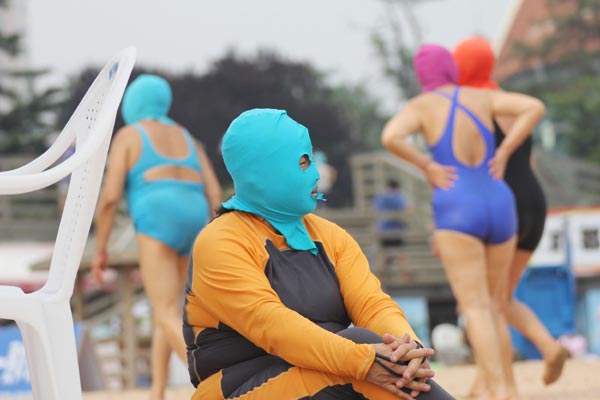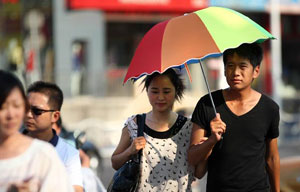Ski masks become sea masks in Qingdao
 |
|
A woman wears a ski mask as she rests on the beach in Qingdao, Shandong province on July 9, 2013. [Photo/China Daily] |
While not as attractive as the sexy swimsuits from which it takes its portmanteau – quite the opposite, arguably – the "facekini" is intended to preserve women' good looks.
But it has drawn a great deal of looks, too, as the ski-mask-like balaclavas used by swimmers in Shandong province' coastal resort town Qingdao has recently captured stares globally.
The nylon or cloth swimwear is meant to block the sun.
Locals say they trace back up to seven years. But nobody has patented them.
They'e believed to be a DIY solution to water's magnification of sunrays by the city’s middle-aged and older women.
Facekinis are now mass produced as protection against not only the sun but also to repel jellyfish and mosquitos. They retail for 15 to 40 yuan ($2.5-6.5).
They're sold nationally online but are especially prevalent at the 21 swimming beaches that crest Qingdao's 731 kilometers of coastline.
Women who wear them also often don full-body suits to fend off sunburn – and in China, where light skin is venerated, resulting tans.
Beijing native Li Ming says: "They look like special forces or marines on a landing operation. Or maybe like spiders … either way, they’re awesome but hilarious."
Local swimmers like 60-year-old Liu Chuanfang believe their utility rises from the frequency with which their users hit the beach.
"I've lived here my whole life and can't live without the ocean. I swim before breakfast, and after lunch and dinner. I believe the skinkini is a must to protect me from three hours a day of bright sunshine."
CNNGo explains their emergence differently: "Bikini babes are out. These fearless Qingdao ladies are the new beach icon in China."
The unusual masks have uncovered new questions about Chinese aesthetics.
Qingdao Evening News columnist A-Zhan says: "It probably won't last and become real fashion because young girls tend to show their beautiful faces in the water. Those wearing them are retired women who swim every day. Others won't go to such extremes for protection."
Netease Dot Com's fashion channel compares facekinis with mask-themed runway shows by big shots like Maison Mart in Margiel, Sibling and Alexander Macqueen.
"It looks like modern Chinese women are also perusing this kind of fashion," the article declared.
A Qingdao surf-side facekini vendor, who only gave her surname Zhang, believes the masks will spread to the rest of China and the world.
"It's very economical and more effective than sunscreen," she says.
"People love it. Who wouldn't?"
There's debate about the origins Chinese preference for lighter skin – counter to the West's tanning aspirations and consequential industry.
Many associate a lighter complexion with persistent historical connotations associating dark skin tones with farming and other manual labor.
"It definitely has to do with the history of China, which is largely an agricultural society,"Alina Zhao was quoted as saying by NBC News.
"Getting tanned means you work outside in the fields a lot. So, skin color is like an indicator of your social status. The fairer you are, the wealthier or more respected you seem."
Related: Feeling the heat
























